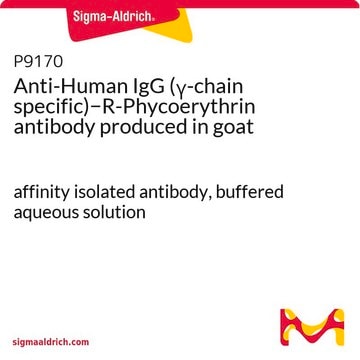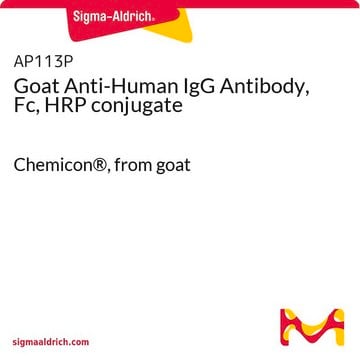SAB4200713
Anti-Human IgG (γ-chain specific) antibody, Mouse monoclonal
clone GG-5, purified from hybridoma cell culture
Synonyme(s) :
Mouse Anti-Human IgG (γ-chain specific)
About This Item
Produits recommandés
Forme d'anticorps
purified from hybridoma cell culture
Niveau de qualité
Type de produit anticorps
primary antibodies
Clone
GG-5, monoclonal
Forme
buffered aqueous solution
Espèces réactives
human
Concentration
~1 mg/mL
Technique(s)
indirect ELISA: 0.25-0.5 μg/mL using 5μg/mL human IgG for coating
Isotype
IgG1
Conditions d'expédition
dry ice
Température de stockage
−20°C
Modification post-traductionnelle de la cible
unmodified
Description générale
Immunogène
Application
Actions biochimiques/physiologiques
Forme physique
Clause de non-responsabilité
Vous ne trouvez pas le bon produit ?
Essayez notre Outil de sélection de produits.
Code de la classe de stockage
10 - Combustible liquids
Point d'éclair (°F)
Not applicable
Point d'éclair (°C)
Not applicable
Faites votre choix parmi les versions les plus récentes :
Certificats d'analyse (COA)
Vous ne trouvez pas la bonne version ?
Si vous avez besoin d'une version particulière, vous pouvez rechercher un certificat spécifique par le numéro de lot.
Déjà en possession de ce produit ?
Retrouvez la documentation relative aux produits que vous avez récemment achetés dans la Bibliothèque de documents.
Les clients ont également consulté
Notre équipe de scientifiques dispose d'une expérience dans tous les secteurs de la recherche, notamment en sciences de la vie, science des matériaux, synthèse chimique, chromatographie, analyse et dans de nombreux autres domaines..
Contacter notre Service technique










